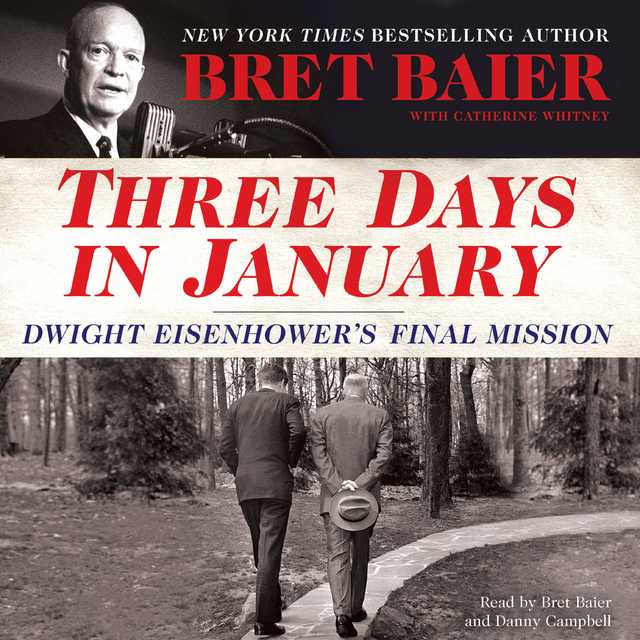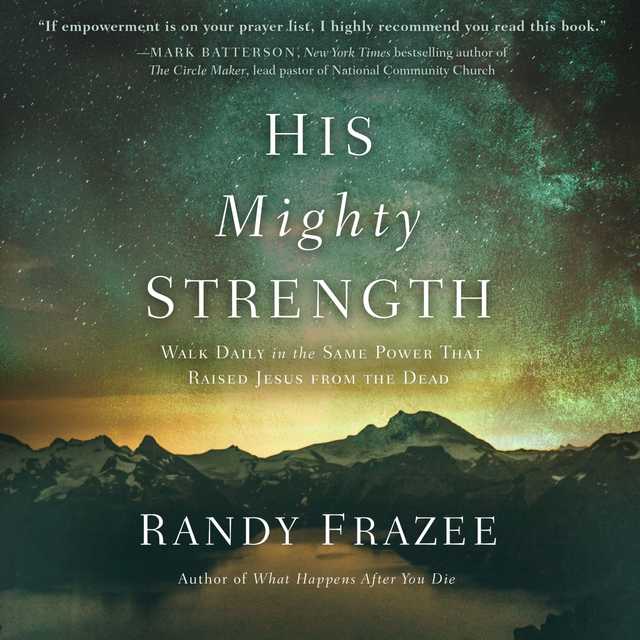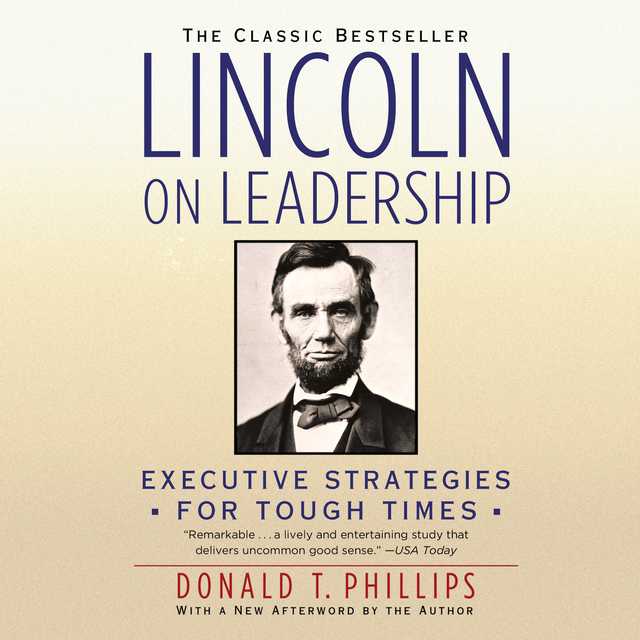Three Days in January Audiobook Summary
The blockbuster #1 national bestseller
Bret Baier, the Chief Political Anchor for Fox News Channel and the Anchor and Executive Editor of Special Report with Bret Baier, illuminates the extraordinary yet underappreciated presidency of Dwight Eisenhower by taking readers into Ike’s last days in power.
“Magnificently rendered. … Destined to take its place as not only one of the masterworks on Eisenhower, but as one of the classics of presidential history. … Impeccably researched, the book is nothing short of extraordinary. What a triumph!”–JAY WINIK, New York Times bestselling author of April 1865 and 1944
In Three Days in January, Bret Baier masterfully casts the period between Eisenhower’s now-prophetic farewell address on the evening of January 17, 1961, and Kennedy’s inauguration on the afternoon of January 20 as the closing act of one of modern America’s greatest leaders–during which Eisenhower urgently sought to prepare both the country and the next president for the challenges ahead.
Those three days in January 1961, Baier shows, were the culmination of a lifetime of service that took Ike from rural Kansas to West Point, to the battlefields of World War II, and finally to the Oval Office. When he left the White House, Dwight Eisenhower had done more than perhaps any other modern American to set the nation, in his words, “on our charted course toward permanent peace and human betterment.”
On January 17, Eisenhower spoke to the nation in one of the most remarkable farewell speeches in U.S. history. Ike looked to the future, warning Americans against the dangers of elevating partisanship above national interest, excessive government budgets (particularly deficit spending), the expansion of the military-industrial complex, and the creeping political power of special interests. Seeking to ready a new generation for power, Eisenhower intensely advised the forty-three-year-old Kennedy before the inauguration.
Baier also reveals how Eisenhower’s two terms changed America forever for the better, and demonstrates how today Ike offers us the model of principled leadership that polls say is so missing in politics. Three Days in January forever makes clear that Eisenhower, an often forgotten giant of U.S. history, still offers vital lessons for our own time and stands as a lasting example of political leadership at its most effective and honorable.
Other Top Audiobooks
Three Days in January Audiobook Narrator
Bret Baier is the narrator of Three Days in January audiobook that was written by Bret Baier
Bret Baier is the chief political anchor for Fox News Channel and the anchor and executive editor of Special Report with Bret Baier. He previously served as Chief White House Correspondent for Fox News Channel and as the network’s National Security Correspondent based at the Pentagon, reporting on military and national security affairs. A recipient of the National Press Foundation’s Sol Taishoff Award for Excellence in Broadcast Journalism, Baier is the author of the New York Times bestsellers Three Days at the Brink: FDR’s Daring Gamble to Win WWII; Three Days in Moscow: Ronald Reagan and the Fall of the Soviet Empire; Three Days in January: Dwight Eisenhower’s Final Mission; and Special Heart: A Journey of Faith, Hope, Courage and Love. He lives with his family in Washington, DC.
About the Author(s) of Three Days in January
Bret Baier is the author of Three Days in January
More From the Same
- Publisher : HarperAudio
- Abraham
- American Gods [TV Tie-In]
- Dead Ringer
- House of Sand and Fog
- Prey
Three Days in January Full Details
| Narrator | Bret Baier |
| Length | 10 hours 34 minutes |
| Author | Bret Baier |
| Category | |
| Publisher | HarperAudio |
| Release date | January 10, 2017 |
| ISBN | 9780062657237 |
Subjects
The publisher of the Three Days in January is HarperAudio. includes the following subjects: The BISAC Subject Code is 20th Century, History, United States
Additional info
The publisher of the Three Days in January is HarperAudio. The imprint is HarperAudio. It is supplied by HarperAudio. The ISBN-13 is 9780062657237.
Global Availability
This book is only available in the United States.
Goodreads Reviews
Steve
February 05, 2017
An interesting book on the life and the presidency of Dwight D. Eisenhower. Eisenhower became president during the Cold War era in the early 1950's. His leadership was tested during that time, I'm sure but he was up to the task. Eisenhower was the supreme commander of the Allied troops in Europe during World War II and planned the D Day invasion of Normandy on June 6, 1944. He proved his leadership in the military battlefield as well as the political battlefield. I have also read in this book and in previous books about Dwight Eisenhower that he grew up in Kansas and that his parents were Mennonites, which opposed war and was disappointed when Eisenhower went to West Point to the United States Military Academy.
Robert
February 18, 2017
I really enjoyed this book. Although it does provide some history of Eisenhower's life and career, both as a general and as president, it focuses on the transition of power from Eisenhower to Kennedy, in January of 1961. The book provided a great deal of fascinating insight into both men, their relationship, and how each viewed the responsibilities of the presidency. Definitely worth the read if you are interested in American history, especially presidential history.
John
May 31, 2018
Should be read by all High School studentsShould be read by all College studentsShould be read by all students majoring in History or Political ScienceShould be read by all PoliticiansShould be read by all citizens or prospective citizens of the United StatesShould be read again and again
Amanda
February 06, 2017
This book is really good . I learned more about Eisenhower then I ever knew before. I had no idea his wife was the one of his life or how close he was to her even though he had all these other responsibilities and duties she was more important to him. That's how love and marriage should be. Also he just was a force to be reckoned with when it came to Wars.
Robert
February 10, 2017
Several weeks ago I won a proof copy of Three Days in January, a sympathetic biography of Dwight Eisenhower written by Bret Baier with Catherine Whitney. I don't see how any serious student of American history can help but admire Dwight Eisenhower as a man, a soldier, and as President of the United States. This certainly holds true with Mr. Baier. His book puts special emphasis on the final speech Ike made as President, which he gave 3 days before his successor John F. Kennedy was inaugurated. Three Days in January is a fascinating work. I learned a lot. For instance, while I knew Eisenhower met several times and had a friendly relationship with his Russian counterpart, General Georgy Zhukov, I was not aware that he enjoyed that same type of relationship with Russian Premier Nikita Khrushchev. When Russian nuclear missiles were discovered on Cuba during President Kennedy's administration, JFK consulted Ike, seeking his opinion on the likely hood of Khrushchev starting a nuclear war if the US put a naval blockade around that island. Relying on friendly conversations about the use of nuclear weapons he previously had with the Premier, Ike gave President Kennedy an educated answer that he did not think Khrushchev would resort to that. Ike was right. Now for the bad stuff: The book fails to mention Ike's alleged affair with Kay Summersby during WWII, and also ignores the deal he made with Earl Warren during the 1952 campaign for the Republican nomination for President. If Warren would drop out of the campaign and shift his support to him, Ike would nominate Warren for Justice of the Supreme Court at the first opportunity. Warren did and Ike did. Warren became Chief Justice. Eisenhower later said he made a mistake in doing this. Three Days in January was well researched, well written, and deserves 4 stars. Robert Walker
Rob
February 26, 2017
Bret Baier, chief political anchor for Fox News, has done a good job putting together a well-written, enjoyable read of Eisenhower’s presidency. If you like presidential politics, “Three Days in January” is not only an interesting look at Eisenhower’s philosophy in dealing with Congress and foreign policy, but it has rich, ironic parallels to today’s tumultuous times. Ike offers some wonderful lessons in leadership applicable to today’s era of polarization and gridlock. Overall, it’s a riveting account of Eisenhower’s determination to end the Korean conflict and prepare America for the perils of a new war – the Cold War.
Buddy
February 17, 2017
Baier focuses on the transition of power between Ike and JFK, giving some important context and analysis. I haven’t read a biography of Eisenhower and so I appreciated this book with its understanding of how Ike positively impacted our nation’s history.
Alexw
October 18, 2020
page 123 Ike's accomplishments listed' End of Korean War, eight years of peace, Interstate Highway System, first civil rights legislation since Reconstruction and several balanced budgets."page 166-Ike is against sending troops to Vietnam but Kennedy says' Vietnam represents the cornerstone of the free world in Southern Asia' which is eerily foreshadowing.After the total fiasco of the Bay Of Pigs, President Kennedy confers with Ike and Ike is incredulous when Kennedy informs Ike that no air support was provided to the American trained invaders and thus left them on the beach to die !!
Scott
September 18, 2022
I learned a lot about President Eisenhower and have increased respect for him and for John F Kennedy.
Mike
January 23, 2021
The implication of the title is that this is all about the last three days of DDE's presidency emphasizing his parting speech (the military industrial complex one) but it is also a bio of 34 for anyone who doesn't necessarily want to become an expert on the man. It's very well done and sheds a lot of light on JFK as well as Eisenhower.
Bob
August 15, 2017
Summary: An account of the final three days of the Eisenhower presidency, focused around his farewell speech, highlighting Eisenhower’s principled leadership and contribution to the nation.Dwight Eisenhower is the first president I remember. My recollections seem to be mostly of Eisenhower on the golf course. He didn’t hold the attention of this five-year old when he spoke. He faded quickly into the background when the dashing Jack Kennedy took office. His successors were much in the news in my growing up and adult years from the Vietnam war to Watergate and the pardon to the Iranian hostage crisis to “morning in America” to “shock and awe.” I didn’t think much about Ike as a president, probably more as the general who led us to victory in Europe in World War Two.Bret Baier suggests that a re-assessment might be worth it. Behind the bland exterior was a president who ended the Korean War and presided over eight years free of war (if not the threat of nuclear war, which he skillfully addressed). He launched the Interstate Highway System revolutionizing travel and transport in America. He signed some of the earliest civil rights legislation (though many will criticize him for not going further) and balanced budgets. He argues he gave the right kind of presidential leadership to a nation weary of Depression and war.Baier explores the life and contribution of this president through the window of his last three days in office beginning with his Farewell Speech, most known for his prescient warnings against the “military-industrial complex.” But first he goes back. He begins with narrating the meeting he had with recently victorious Jack Kennedy in early December, and Eisenhower’s determination to make a much better transition than Truman had in handing the presidency over to him, briefing the incoming president on everything from the policy apparatus he had put in place (which Kennedy dismantled) to world and domestic situations. Significantly, he briefed him on a covert operation in the planning stages against Castro’s Cuba involving a landing in the Bay of Pigs. He warned against moving forward unless adequate leadership was in place. Kennedy mistook this for an endorsement of the operation.Baier then recaps Eisenhower’s life from boyhood, to military service to his rise to the Allied command, post war activities, and his entry into politics as a very apolitical Republican (much to Truman’s disappointment, perhaps accounting for the frosty reception he gave Eisenhower).He recounts the Farewell Speech itself, which he sees as modeled after Washington’s. He explores the writing of the speech and Eisenhower’s interactions with his speechwriters. He describes a relationship with Congress that was “interdependent,” striking because Democrats were in the majority for six of the eight years of his presidency. Eisenhower regularly hosted bipartisan meetings of Congressional leadership and fostering warm personal relations with Sam Rayburn and Lyndon Johnson.He describes the hostile global situation, particularly significant because of the chill in relations with the Soviets despite Ike’s efforts to pursue peace, recognizing the necessity of a strong deterrence. He had fought along with the Soviets against Germany, forging personal ties with General Zhukov, and hoped it could eventuate in a more durable peace, which was not to be. He goes on to discuss Ike’s frustration both with the false accusations of a “gap” in the arms race when the U.S. enjoyed superiority, and with his inability to find a way out of that race, which he recognized an exercise in futility.Finally, he turned to the “military-industrial” complex in which peace-time defense industries and their survival threatened to co-opt American foreign policy for its own perpetuation. He warned:“In the councils of government, we must guard against the acquisition of unwarranted influence, whether sought or unsought, by the military-industrial complex. The potential for the disastrous rise of misplaced power exists and will persist. We must never let the weight of this combination endanger our liberties or democratic processes. We should take nothing for granted. Only an alert and knowledgeable citizenry can compel the proper meshing of the huge industrial and military machinery of defense with our peaceful methods and goals, so that security and liberty may prosper together.”The concluding section of Baier’s book covers the last three days. He discusses the thorough work Eisenhower did in planning the transition from his end to provide continuity and to allow the new president to be able to lead well from day one. He held a good-bye press conference. On his last day, he dealt with the huge snowfall that blanketed D.C. and prepared to greet the incoming president and for the handing off of power. He said goodbyes to the White House staff, met the Kennedys, heard Kennedy’s magnificent address, and then departed for Gettysburg.He would meet again with Kennedy a few months later at Camp David, where he discussed the failed Bay of Pigs mission with Kennedy and helped him debrief that experience and consider how he would handle future instances of proposed actions. Eisenhower unfailingly offered his advice when sought, wrote his memoirs and enjoyed a resurgence of popularity until his health failed in 1968 and he passed in 1969.Baier’s account seemed to me more adulatory than a balanced history. Yet he underscored several important points about Eisenhower worth consideration by our present political leaders. One was his willingness to work with the whole Congress and not just his own party. There was clarity about the common task they shared to serve the whole country, even while they differed at times how to do so. Country was always ahead of personal ambition. A second was the soldier committed to pursuing peace, perhaps truer to his Quaker roots than many thought him. He got the country out of Korea and kept it out of war, while never sacrificing a clear-eyed strong defense. And finally, he was a man of principle, not perfect but honorable. Baier’s point is that these are qualities that we should look for in all of our presidents, something I cannot dispute. The tougher question to my mind is, why don’t we?
Patrick
April 01, 2017
I am grateful for this brief portrayal of the life and accomplishments of President Eisenhower. I could not help but wonder how many phoney wars we have had since his presidency, because the sitting president didn't heed his words about guarding, "against the acquisition of unwarranted influence, whether sought or unsought, by the military-industrial complex."
Tommy Lee Johnson
June 29, 2021
This book is for people who only know the presidential Eisenhower as the Cassandra of the military-industrial complex; and even then probably have the story wrong. Another reviewer gave the book two stars for the exactly the reason I give it four. It is not a detailed biography of Ike the man or the president. It is not a political history of depths of the Cold War. It is brief, easily understandable account of an important moment in American history that is forgotten. Our current attitudes toward Russia are rooted in a time most of us don't even remember. (I was three years old when Kennedy was inaugurated.) If you are looking for an introduction to time that is more important than most of us realize, this one is pretty decent.
Most Popular Audiobooks
Frequently asked questions
Listening to audiobooks not only easy, it is also very convenient. You can listen to audiobooks on almost every device. From your laptop to your smart phone or even a smart speaker like Apple HomePod or even Alexa. Here’s how you can get started listening to audiobooks.
- 1. Download your favorite audiobook app such as Speechify.
- 2. Sign up for an account.
- 3. Browse the library for the best audiobooks and select the first one for free
- 4. Download the audiobook file to your device
- 5. Open the Speechify audiobook app and select the audiobook you want to listen to.
- 6. Adjust the playback speed and other settings to your preference.
- 7. Press play and enjoy!
While you can listen to the bestsellers on almost any device, and preferences may vary, generally smart phones are offer the most convenience factor. You could be working out, grocery shopping, or even watching your dog in the dog park on a Saturday morning.
However, most audiobook apps work across multiple devices so you can pick up that riveting new Stephen King book you started at the dog park, back on your laptop when you get back home.
Speechify is one of the best apps for audiobooks. The pricing structure is the most competitive in the market and the app is easy to use. It features the best sellers and award winning authors. Listen to your favorite books or discover new ones and listen to real voice actors read to you. Getting started is easy, the first book is free.
Research showcasing the brain health benefits of reading on a regular basis is wide-ranging and undeniable. However, research comparing the benefits of reading vs listening is much more sparse. According to professor of psychology and author Dr. Kristen Willeumier, though, there is good reason to believe that the reading experience provided by audiobooks offers many of the same brain benefits as reading a physical book.
Audiobooks are recordings of books that are read aloud by a professional voice actor. The recordings are typically available for purchase and download in digital formats such as MP3, WMA, or AAC. They can also be streamed from online services like Speechify, Audible, AppleBooks, or Spotify.
You simply download the app onto your smart phone, create your account, and in Speechify, you can choose your first book, from our vast library of best-sellers and classics, to read for free.
Audiobooks, like real books can add up over time. Here’s where you can listen to audiobooks for free. Speechify let’s you read your first best seller for free. Apart from that, we have a vast selection of free audiobooks that you can enjoy. Get the same rich experience no matter if the book was free or not.
It depends. Yes, there are free audiobooks and paid audiobooks. Speechify offers a blend of both!
It varies. The easiest way depends on a few things. The app and service you use, which device, and platform. Speechify is the easiest way to listen to audiobooks. Downloading the app is quick. It is not a large app and does not eat up space on your iPhone or Android device.
Listening to audiobooks on your smart phone, with Speechify, is the easiest way to listen to audiobooks.






























